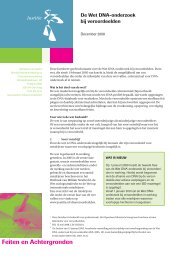INTERPOL HANDBOOK ON DNA DATA EXCHANGE AND PRACTICE
INTERPOL HANDBOOK ON DNA DATA EXCHANGE AND PRACTICE
INTERPOL HANDBOOK ON DNA DATA EXCHANGE AND PRACTICE
Create successful ePaper yourself
Turn your PDF publications into a flip-book with our unique Google optimized e-Paper software.
CASE MANAGEMENTWhen dealing with an investigation of this nature, effective management is critical in ensuringthe efficient utilization of police and laboratory resources. The management of <strong>DNA</strong> casesshould target the collection of evidence from the scene, evidence submission policies anda holistic scientific approach that takes into account the probative value of all the availablephysical evidence. Such case management policies are especially important in criminalinvestigations requiring intelligence-led <strong>DNA</strong> screening as part of the investigative process.•policies for police dna case managementRapid innovative changes in the field of forensic <strong>DNA</strong> profiling make consultation withthe <strong>DNA</strong> expert/laboratory an integral part of the investigative process of any case.It is advisable for police investigators or prosecutors to contact the forensic specialist todiscuss what <strong>DNA</strong> technologies currently exist for the examination and testing of thebiological evidence connected with their case.The effectiveness of <strong>DNA</strong> profiling can be compromised by chemicals and contaminantsand these may influence which type of scientific analysis is to be used. Consequently,investigators, in collaboration with the scientist, must evaluate the available physicalevidence to determine which scientific analysis will provide the court with evidence of thehighest probative value. For example, the decision to process the scene for fingerprintsor swab for <strong>DNA</strong> evidence requires knowledge of both the effect of the fingerprintingprocess on <strong>DNA</strong> and the probability of successfully recovering <strong>DNA</strong> from an item.There are documented case management guidelines for:• <strong>DNA</strong> Evidence Recovery based on an understanding of the potential value of theevidence and its impact on and ability to assist a case. The effective recovery of<strong>DNA</strong> evidence from the crime scene is achieved when officers are well informed ofthe evidentiary potential of <strong>DNA</strong> and trained in <strong>DNA</strong> evidence recovery (see <strong>DNA</strong>Sampling and Evidence Collection).• Appropriate packaging and preservation of <strong>DNA</strong> evidence that maintains its integrityand prevents contamination (see <strong>DNA</strong> Sampling and Evidence Collection).• Comprehensive documentation and case details to assist in the laboratory analysisprocess and demonstrated chain of custody requirements based on legal requirements(see In the Laboratory).• Evidence submission based on clear investigative objectives as dictated by thecircumstance of the case. Submission policies are especially valuable in cases involvinglarge numbers of exhibits and serve not only to efficiently allocate resources but alsoto focus the scientific and criminal investigation.• An effective case management policy will directly impact the forensic analysis byallowing the scientist to target those exhibits that yield evidence of the highestprobative value, select the most appropriate <strong>DNA</strong> techniques and complete theanalysis of the cases in the most efficient manner.PAGE 18CASE MANAGEMENT







